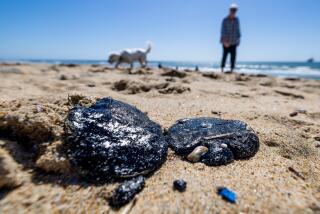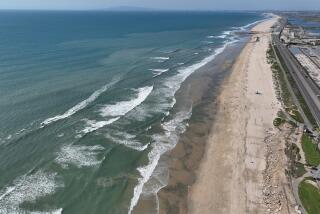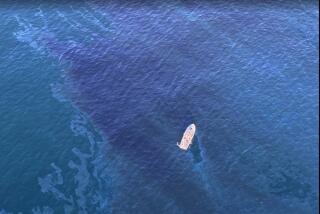Winds and Tides Push Oil Ashore : Disaster: Pollution is worst yet on Huntington and Bolsa Chica beaches. Extra workers are deployed.
- Share via
Winds and tides worked in concert Monday to pushed bands of thick black crude oil onto Huntington and Bolsa Chica state beaches, producing the worst pollution yet from last week’s 394,000-gallon spill off the Orange County coast.
Overwhelmed by the onslaught of blackish goo that coated vast stretches of the state beaches north of the Huntington Beach Municipal Pier, officials rushed to deploy nearly 200 additional workers, increasing cleanup crews by a third. But many of the newly enlisted were in training or en route to the scene--not on the shoreline where by mid-afternoon the slick was foiling the round-the-clock cleanup efforts.
Meanwhile, the 80,000-ton tanker American Trader, with more than 19 million gallons of crude oil still aboard, returned Monday evening under its own power to Long Beach Harbor, anchoring just inside the breakwater. The two holes in its hull, apparently caused by its own anchor as it attempted to moor off Huntington Beach to unload oil for a mainland refinery, had been patched with plywood, foam and sheet metal. Coast Guard officials authorized the vessel’s owners, American Trading Transportation Co., to move the tanker after an inspection of the hull found no traces of oil.
The vessel made the 11-mile trip to Long Beach in about three hours, escorted by the Coast Guard cutter Blackhawk, a state Department of Fish and Game boat and an oil-skimming vessel. A Coast Guard helicopter shadowed the 21-year-old tanker from above. The American Trader is expected to berth today, and crew members will unload its cargo of crude.
Despite the heavy flow of oil along the coast, an aerial inspection by state fish and game experts found no serious damage so far to any of the wildlife estuaries and marshlands along the coast. Even so, additional personnel were dispatched to bolster spill defenses at sensitive coastal points, including the Huntington Beach wetlands, where booms and an earthen dike have been breached twice by small amounts of tainted seawater in recent days.
“This is the heaviest impact we’ve seen on the beaches,” said U.S. Coast Guard Capt. Jim Card, the federal coordinator of the spill cleanup.
The Coast Guard said one-third of the Alaskan crude still menaced the coast Monday night. Skimmers had picked up 29% of the spill and 43% had evaporated or naturally dissipated.
As the oil washed ashore Monday, it created lethal conditions for wildlife. By late afternoon, 226 oil-soaked birds had been rescued, up from 99 the day before. Another 24 birds died, bringing the death toll to 72.
“It was the worst day yet for wildlife,” said Curt Taucher, a spokesman for the state Department of Fish and Game.
A plea was issued for sheets, towels and sturdy boxes to be brought to the bird collection center at Magnolia Street and Pacific Coast Highway to clean and hold the the injured birds, including scoters, grebes and murres, all common shore birds. Many of the birds picked up oil sitting or feeding in the glistening 14-mile-long slick that was nearly 5 miles wide in some places Monday.
In Long Beach, the Coast Guard reported Monday that drug tests on the tanker’s captain, Robert La Ware, mooring pilot John Keon and the ship’s second mate, who were on the bridge at the time of the accident, were negative. Earlier tests for alcohol also were negative.
The weather--an ally since the hull of the 800-foot tanker was apparently pierced by its own anchor, freeing nearly 9,400 barrels of Alaskan crude--turned into the enemy on Monday. A blustery front approaching from the north and early morning high tides were a disastrous combination for the army of workers who had succeeded in keeping pace with the capricious slick. Some area beaches suffered their first daylong assault from the slick.
.
“Looks like it finally made its mind up,” said Huntington Beach Fire Captain Ray Picard. “What’s left out there appears to be washing up in a big way.”
Coast Guard officials monitoring the slick said bands of tar and brownish foam 20 to 30 feet wide and, in places, two inches thick washed ashore at Bolsa Chica State Beach north of Huntington Beach. The oily tides struck near the inland Bolsa Chica Wetlands, an ecological reserve that is home to the endangered California least tern as well as a temporary home to thousands of migratory birds and much marine life. But a wide stretch of beach and Pacific Coast Highway separates the saltwater marsh from the fouled coast.
Smaller fingers of the slick, lurking just beyond the surfline most of the day, also marred portions of city and state beaches in Huntington Beach. Lifeguards reported thick balls of oil that resembled tar.
Before dawn, fumes from the crude were so noxious that a dozen cleanup workers became ill with headaches and nausea, forcing state health officials to suspend the cleanup for several hours. No serious injuries were reported, however.
After nightfall, battling falling temperatures and high winds, cleanup workers waged an almost futile effort to keep up with the oil hitting the shore.
“We had this area here in great shape yesterday (Sunday),” a despondent Cecil Gore, a paid worker said. “Then it came ashore again.”
Throughout the day, sightseers jammed Pacific Coast Highway near the Huntington Beach bluffs. Many of the gawkers, using binoculars and telescopes, peered down at the workers swabbing the sand in their smudged slickers. Others posed for pictures with the idle American Trader in the distance.
Karen Angelo, a Connecticut tourist, brought her two sons to look at the mess.
“It’s kind of important for them to see it,” she said. “I don’t think they’ll understand unless they can see it and smell it.”
Earlier in the day, with heavy oil coming ashore, officials ordered more than nine miles of beach in Huntington Beach closed for a minimum of three weeks. Closure, they said, would aid cleanup and bird-rescue efforts. Sunset Beach also was placed off limits.
In Seal Beach, a tiny town straddling the Orange and Los Angeles county line, officials also closed beaches, though no oil had reportedly come ashore. The beach was closed so that injured birds could take refuge.
“It is of vital importance to keep people off the beaches. The contaminated birds are frightened by the crowds on the beach and will not come ashore where they can be safely rescued,” said biologist Esther Burkett of state Department of Fish and Game.
Newport Harbor, Anaheim Bay, Huntington Harbour and the San Gabriel River remained closed to vessel traffic.
At the Anaheim Bay wildlife refuge, Navy spokesman Robert Montgomery said workers were doubling the amount of boom material from about 3,500 feet to 7,000 feet at the entrance to a wetland area, bracing for winds that could accompany the approaching cold front.
“The oil would have to get by six sets of booms to get to the marsh, and we’re confident that couldn’t happen,” Montgomery said. “If it did get all the way in, I really shudder to think about what would happen.”
By Monday night, officials estimated 110,000 gallons of oil was still floating off the Orange County coast.
Skimming efforts to remove the rest of the oil were threatened by an Alaskan cold front working its way down the coast. The front, officials said, could bring rough seas and force suspension of the skimming by at least 20 Navy, Coast Guard and private vessels.
British Petroleum, owner of the spilled oil and the lead company in the cleanup effort, arranged for reinforcements to bolster the crew of 400 trained workers combing the beaches.
“The weather has us very concerned,” said Tom Thomson, a public affairs officer for British Petroleum. “We’re getting hundreds of people out on the beach . . . and we’re gearing up for whatever may come when this front hits.”
The additional crews were hired by Southwest VECO Inc., the company that supervised the cleanup of the Exxon Valdez oil spill last year.
“BP wanted VECO involved in a lead role because of the oil that is coming on shore right now,” said John Kerrigan, vice president and regional manager for VECO, a $1-billion-a-year corporation that is based in Anchorage but has a regional office in Long Beach. “That, plus the storm that’s coming, could really make for a mess down on the beach.”
After word spread that more workers were needed, a line of people stretched around the block at VECO’s Long Beach offices, asking for one of the $10-an-hour cleanup jobs. VECO gave workers crash courses in beach cleanup, outfitted them with protective gear and then dispatched them to the beaches.
Beach cleanup normally requires a 40-hour course, said Mac McKee, construction manager for the firm’s Long Beach office. But because of the amount of oil washing up, workers were being sent out after a short, four-hour crash course.
VECO said it was sending 130 cleanup workers to the affected area Monday afternoon, and hoped to send 75 more in time to work the night shift. By this morning, VECO expects to have about 450 to 500 workers on both daytime and nighttime shifts, a spokeswoman for the firm said.
British Petroleum officials would not confirm those numbers but one spokesman said they were “in the ballpark.”
Meanwhile, politicians and celebrities continued their barrage of press conferences on the oil spill.
In Washington, President Bush said he sees no connection between the oil spill from a tanker off Huntington Beach and environmental questions on offshore oil drilling.
But Sen. Alan Cranston (D-Calif.), who toured the fouled sand near the Huntington Beach pier Monday, said Bush is “not well informed” about offshore oil drilling if he does not see the link to tanker safety. Cranston said recent federal studies have reported that “the more drilling platforms you have the more tankers you will need.”
“I’m sure he’s concerned,” Cranston said after flying over the spill in a helicopter. “But he’s not concerned enough.”
Earlier in the day, a group of politicians and celebrities organized by the American Oceans Campaign, a Los Angeles environmental group, held a seaside press conference in Huntington Beach to call for tougher legislation regarding oil spills.
The group included actor James Garner, Rep. Barbara Boxer (D-Greenbrae), Assemblyman Tom Hayden (D-West Los Angeles) and state Atty. Gen. John K. Van de Kamp. They support new laws requiring tankers to be double-hulled and the creation of a superfund to pay for oil spill cleanups.
“If we don’t do something about the environment, the rest means nothing,” Garner said. “We won’t have any air, we won’t have any water, we won’t have any birds and we won’t have any fish.”
One politician who has not visited the scene, Gov. George Deukmajian, was invited to by Huntington Beach Mayor Thomas J. Mays.
Times staff writers Ted Johnson, Dave Lesher, Eric Lichtblau and Danica Kirka contributed to this story.
DRILLING PLANS--President Bush said he would not ban offshore drilling. A27
More to Read
Sign up for Essential California
The most important California stories and recommendations in your inbox every morning.
You may occasionally receive promotional content from the Los Angeles Times.











